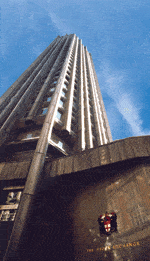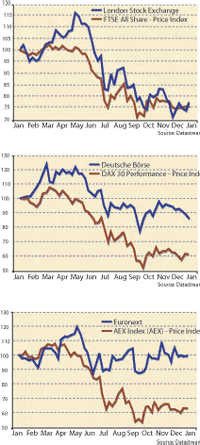Consolidation continues to raise its head, but few can predict how the exchange landscape will look at the end of this year.

Three years ago it looked as if Europes stock exchanges would consolidate in the blink of an eye. Deutsche Brse Frankfurt and the London Stock Exchange (LSE) announced that they would merge to become iX, the worlds fourth-largest stock exchange after the New York Stock Exchange, Nasdaq and Tokyo. The rest of the bourses would just fall into line.
The world is still waiting. From the time iX failed, cross-border exchanges have proven harder to create than imagined.
Thats not to say there hasnt been action. Even before the collapse of the Frankfurt/London deal, the September 2000 merger of the bourses in Paris, Brussels and Amsterdam had already formed the transnational exchange Euronext. That France-based exchange expanded in February 2002 with the acquisition of Portugals bourse, and speculation continues to swirl that the three European giantsEuronext, Deutsche Brse and the LSEare set for a new bout of maneuvering. In mid-January, as Global Finance went to press, that reached fever pitch, only to subside again as Deutsche Brse kept its powder dry.
Any reshuffling of the European exchange line-up would take place against a radically reshaped landscape for share trading. Three years ago exchanges were vying to capture swelling flows from retail investors, as well as tap into institutional trends such as the erosion of country-based investing by sectoral styles.
Since then, plunging stock prices, the drying up of IPO issuance and swooning trading volumes have all conspired to make the climate tough for exchanges. Euronext reported volumes down 8.3% in 2002, while Deutsche Brse trade volumes fell 22%.
Euronext and Deutsche Brse have both made no secret of their ambitions for the LSE. Its partly that perceived threat that powered last years abortive talks over forming an alliance with Nasdaq.
But anyone hoping for a swift consolidation of Europes exchanges may still have to wait, say some observers. I dont think the market is ready for something all that substantial, says Mamoun Tazi, a financial services analyst at Schroder Salomon Smith Barney in London. I think if somethings going to happen, it will be in the second half of 2003, and I think one shouldnt look at exchange consolidation so much as consolidation in post-tradingi.e. clearing and settlement.
There are signs that is happening already. For several months the London Clearing House and its French counterpart Clearnet have been in talks about a link-up. If the two merge, they will form Europes biggest clearer for equities and bonds. This should cut users trading fees, as a netting system puts trades against each other, so reducing risks.
Euroclear merged with CRESTCo, settlement provider for the United Kingdom and Ireland, in September last year with the same aim of providing a uniform settlement system for hundreds of stocks. Euroclear handles clearing of Euronext stocks and is 80% owned by Europeans.
Both these mergers align London closely with Euronext (which owns London-based Liffe), which may be significant in forthcoming maneuvering between Euronext, Deutsche Brse and the LSE.
While the United States has one clearing provider, the Depository Trust & Clearing Corporation (DTCC), the situation in Europe is still complicated by varying systems in different countries. A unified European clearance and settlement system was in part stymied by Deutsche Brses decision last March to reject a bid from Euroclear for DBs stake in international securities depository Clearstream. Instead Deutsche Brse went on to buy 100% of Clearstream. This creates a vertical silo, with no choice available to have a German share trade cleared anywhere but with Clearstream. The arrangement may be good for Deutsche Brse shareholders but arguably poor for brokers.
The horizontalist position is held by the European Securities Forum, a lobbying group, and also by the LSE, which moreover hopes that regulation may bring in a single back-office system. It might seem strange that a free-market-oriented organization such as us should want a monopoly, says a spokesperson for the LSE, but research shows that here its the most efficient system. Competition then goes on top of that. The LSEs stance is that market forces themselves will not bring about a single provider, and the European Commission should intervene.
Mark Winter, head of dealing at Rothschild Asset Management in London, says the issue is clouded by the difficulty of establishing the real costs of trading. Youve got explicit costs on the one hand, like commission, stamp duties in the UK, etc. But then there are the implicit costs like cost of market impact and opportunity cost. Id say that the explicit costs are really just the tip of the iceberg.
Whether an element of share trading should be viewed as a utility or a service garnering profits for other shareholders points to the strange position that exchanges hold. The worth of privatized exchanges can reflect broader equity values in a self-referential way.

|
|
|
For instance, Deutsche Brse Group (which placed itself on its own prime index late last year, two years after floating) made healthy revenues last year in large part because of unhappy share prices. Its derivatives arm, Eurex, capitalized on market uncertainty as investors rushed to hedge their bets on volatile stock markets. Owning a derivatives exchange therefore buffers risks of what the markets as a whole may do.
Over the 18 months up to last October, trading of derivatives on exchanges grew faster than over-the-counter for the first time in 10 years, according to a report from investment bank Morgan Stanley. Both sectors grew steadily in response to changes that Eur-opean institutional investors are making to attitudes on risk management, said the bank. Morgan Stanley expects exchanges share of derivatives trading to rise yet further, with growth at Liffe and Eurex over the next three years expected to be in double figures.
That growth and the successful deployment of new technology have spurred Euronext-Liffe and Eurex to redouble efforts to cut into the American futures markets. The Chicago Board of Trade (CBOT) announced in January that it would lease the London-based derivatives exchanges Connect trading system. The Chicago exchange had previously used Eurex technology.
The fact that its two European exchanges scrapping to supply technology to the heartland of derivatives is an irony not lost on market players. It also serves as a reminder that concentrating solely on the maneuvering of flagship stock exchanges may mean missing much of the action thats going on underneath.
|
ECNs Keep Their Heads Above WaterJust |
|
Instinet, which took over rival Island ECN last year, already takes more than a quarter of the volume of trades in Nasdaq-listed companies. Last December the New York-based company announced plans to cut into trading at the NYSE, where currently more than 80% of trades are done on the exchange floor. But at the same time Instinet, which is majority-owned by Reuters, has had to cut jobs and prices to get by.
In Europe ECNs and other alternative trading systems have had a still tougher time. They have fared poorly, partly because they tend to rely on orders taken from retail brokers. The slump in retail share trading since the tech bubbles burst has thus hit electronic exchanges as well as the online brokerages that gave them business.
The electronic exchange Jiway, owned by Swedens OM group, closed last October. The exchange had opened in February 2000, a month before the peak of the Internet stock boom. Immediately before its close, Jiway had fewer than 100 trades a day.
Virt-xwhich started in 1996 as Tradepoint Financial Networks, a UK exchangehoped to become a model for pan-European cross-border equity trading. The struggling firm was bailed out in 2000 by the Swiss Exchange and has since remained essentially a provider of Swiss blue chips, with limited trading in other European stocks. Swiss Exchange made a successful move last December to take complete control of Virt-x. That move spelled the end for its pan-European hopes.
A problem for alternative systems in Europe is that without liquidity investors will not use the service; that, of course, discourages liquidity. Potential solutions include the active trading system offered by Londons Liquidnet. An order put into the system may not be matched, but the ECN will at least flag the party that theres somebody else out there. A new order can then be put in.
Deutsche Brse has in a sense joined its own competition, leasing out its Xetra Best as an alternative system that allows traders to put in order bids that, if not met, will be routed onto Deutsche Brses own books.
Tensions between ECNs and conventional exchanges will persist. The Chicago-based ECN Archipelago was classified as an exchange in 1997. As an exchange, we are regulated by the SEC rather than NASD, says the companys chief information officer Stuart Townsend, and given the historical ties between the NASD and Nasdaq, this was one of our reasons for becoming an exchange.
|
Nasdaqs Dreams Fade
Nasdaqs dreams of global 24-hour trading have had a harsh wake-up call. Nasdaq Japan closed last summer after only two years trading, making losses of around $30 million. Nasdaq Europe is stumbling along, but with low levels of trading and the complete drying up of technology IPOs, its future looks uncertain. The exchange has had no new listing since before it ceased being Easdaq in 2001.
Nasdaq kept promising us this and then that, but never delivered, says Karen van Griensven, CFO of Belgium-based microchip company Melexis, which delisted from Nasdaq Europe last month after listing on Euronext the previous May. One of the assurances referred to is that the new trading system SuperMontage would boost liquidity on the exchange. We just didnt have the liquidity with Nasdaq, and it didnt make business sense to maintain two listings, van Griensven says.
Another Belgian firm, biotechnology firm Innogenetics, decided to put its shares on the home market last December. Austrian technology company Topcall relisted on the Vienna exchange earlier this month and says it will be reviewing its Nasdaq Europe listing.
Some companies are critical of the market-maker system on Nasdaq, which they say is part of the reason for low liquidity. There is also sticky liquidity in that stocks may trade more on their home markets where their names are better known by retail, but also institutional, customers.
As well as shelving any plans for Asia, Nasdaq has said that it is no longer hoping to establish a single European stock market but will focus on establishing different stock markets in different European countries. Hence Nasdaq Deutschland, which, formed with banks and the exchanges of Bremen and Berlin, will launch later this year. The exchange will be retail-aimed, a strategy that will rely on a hefty increase in the (now minimal) retail share-trading market.
Nasdaq was reportedly close to doing a deal with the London Stock Exchange last year, but nothing came of the talks. A deal could still be in the offing, but Nasdaq is not the strong and attractive suitor that it used to be, and for the moment the LSE can continue its standoffish stance.
Benjamin Beasley-Murray



